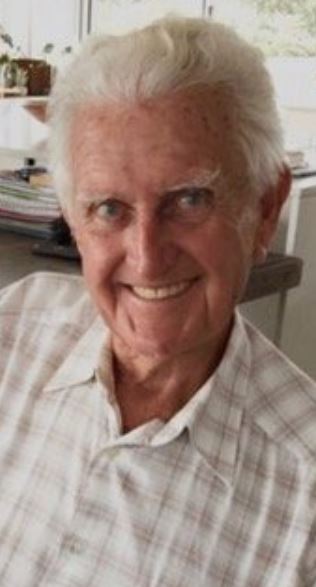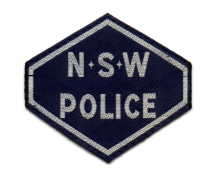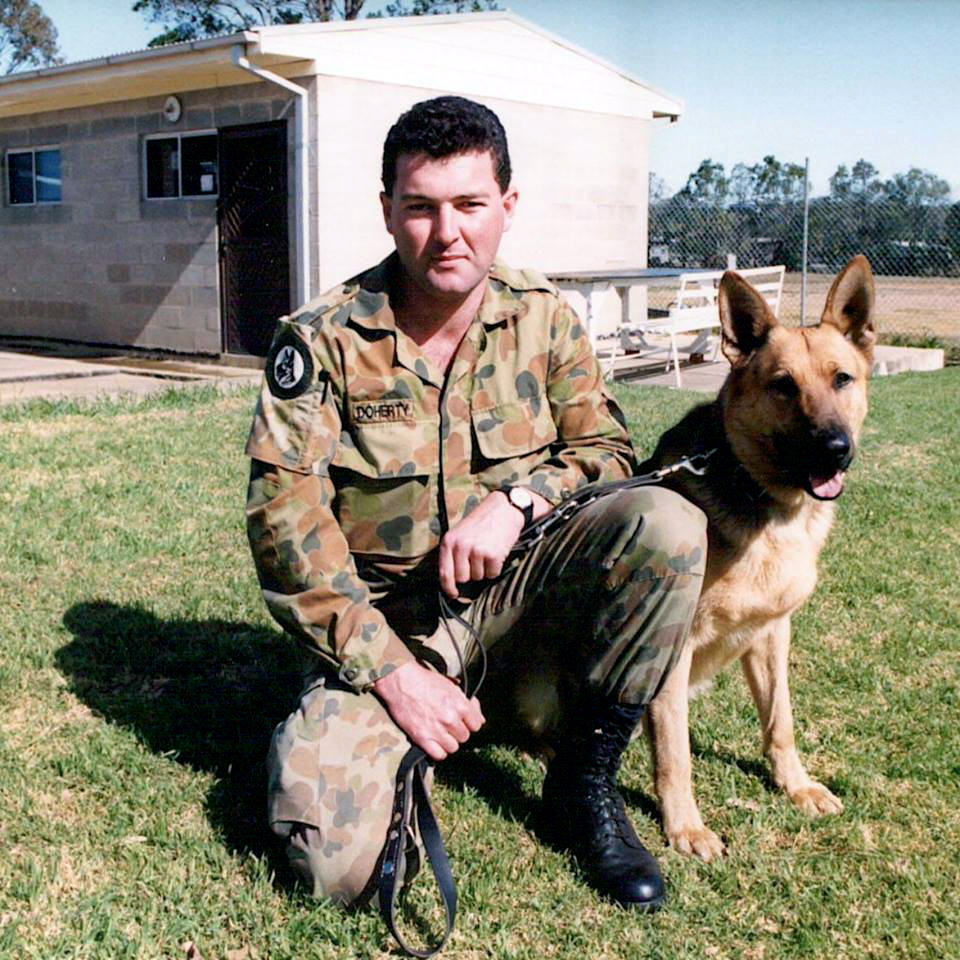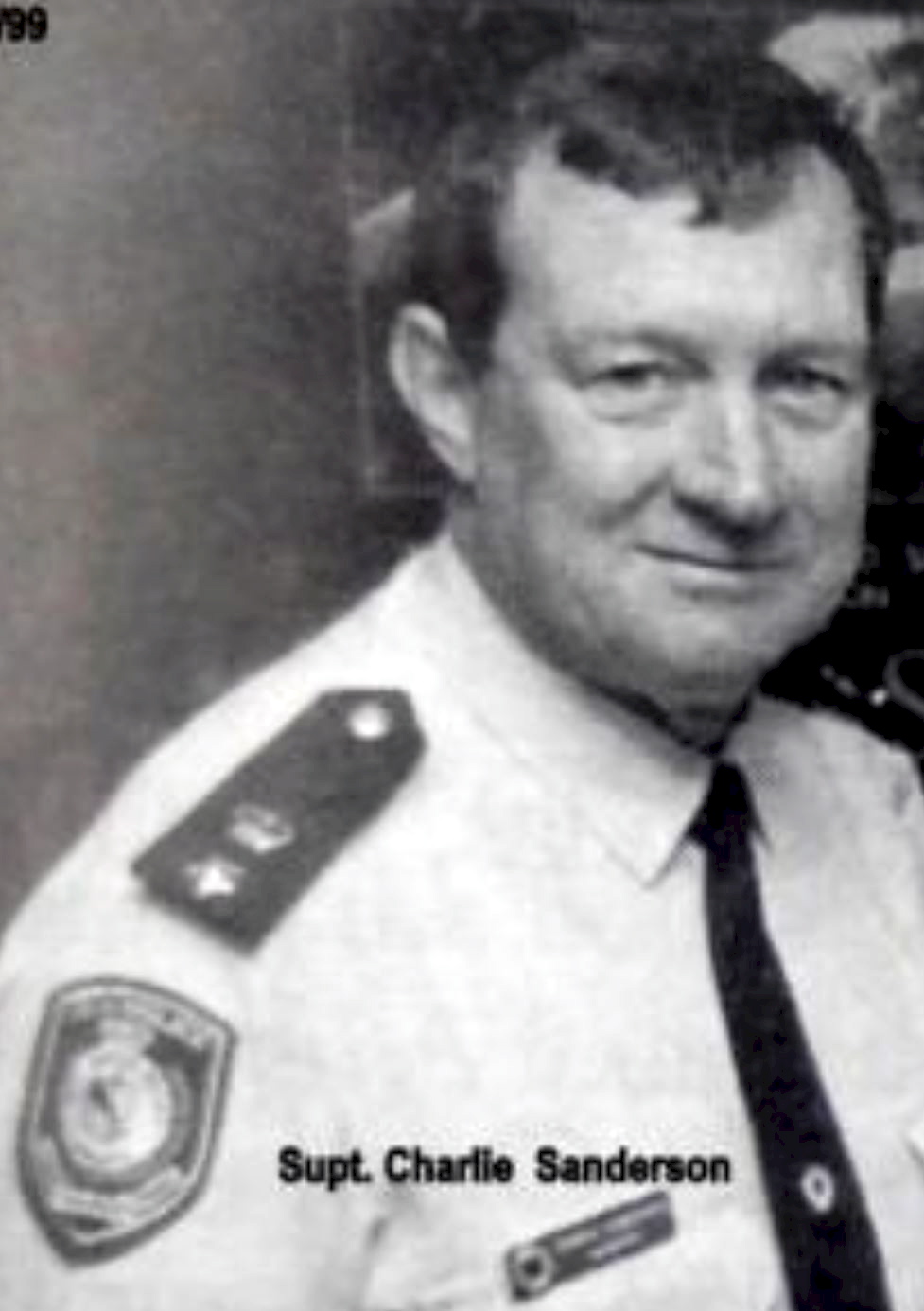Mervyn Lindsay BECK
Mervyn Lindsay BECK
Late of West Gosford
” O.I.C. OF BECK’S RAIDERS “
Penrith Police Training College, High St, Penrith – Class 1 of 1946
New South Wales Police Force
[alert_yellow]Regd. # 4875[/alert_yellow]
Rank: Probationary Constable – appointed 7 January 1946
Detective
Sergeant 2nd Class – appointed 19 November 1966
Sergeant 1st Class – appointed 1 December 1970
Senior Inspector – appointed 14 April 1978
Final Rank = Detective Superintendent
Stations: ?, Darlinghurst, North Sydney, O.I.C. Central Police Station, O.I.C. Special Gaming Squad – known as “Beck’s Raiders ” to squash casinos – Retirement
Service: From ? ? pre January 1946? to 13 February 1982 = 36+ years Service
Awards: Police Overseas Service Medal – Clasp CYPRUS – granted 8 July 1992
Born: 14 February 1922 ( St Valentine’s Day ) in Goulburn, NSW
Died on: Wednesday 21 March 2018
Age: 96
Cause: ?
Event location: ?
Event date: ?
Funeral date: Tuesday 27 March 2018 @ 11am
Funeral location: Rose Chapel, Palmdale Memorial Gardens, 57 Palmdale Rd, Palmdale
Funeral Parlour: Creightons Funeral Service 02 43241533
Buried at: ?
Memorial located at: ?
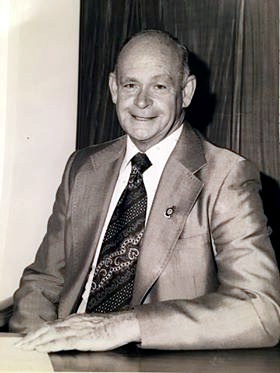
[alert_yellow]MERV is NOT mentioned on the Police Wall of Remembrance[/alert_yellow] *NEED MORE INFO
[divider_dotted]
Funeral location: [codepeople-post-map]
[divider_dotted]
FURTHER INFORMATION IS NEEDED ABOUT THIS PERSON, THEIR LIFE, THEIR CAREER AND THEIR DEATH.
PLEASE SEND PHOTOS AND INFORMATION TO Cal
[divider_dotted]
May they forever Rest In Peace
[divider_dotted]
14.02.1922 – 21.03.2018
Aged 96 years
Late of West Gosford
Former Police Superintendent
Beloved husband of Elsie.
Devoted father of Elizabeth, Pauline, Mitchell and Charlene.
Loved grandfather and great grandfather.
Family and friends are warmly invited to attend the Funeral Service for Mr Beck to be held at 11 am on TUESDAY (27th March 2018) in the Rose Chapel at Palmdale Lawn Cemetery and Memorial Park Palmdale Road, Palmdale.

02 4324 1533
“Proudly Australian”
Published in The Sydney Morning Herald on Mar. 23, 2018
Merv Beck’s sledgehammer wreaked havoc with SPs
Beck’s Raiders launched a sledgehammer into SP bookmakers, very much a part of the Australian way of life in 1979. On friendly terms with the police and politicians, the illegal betting operators flourished.
To divert the rivers of pelf for the public good, the state government introduced the TAB in December 1964. However, it was business as usual for the off-course bookies. Then along came Merv Beck, heading a special squad that had a similar impact to that of Elliot Ness and the Untouchables on Prohibition in the US.
The first TAB opened at Angel Place under Ken Page, who went on to become the answers man for the TAB and a wonderful contributor, in the city at 8.30am. Business built up despite bets being cut off 40 minutes before the race started. No radio broadcast, either. ”By 11am there were queues back to the walls,” Page recalled. ”I was still counting the money at 3am.”
Peanuts compared with the SP bookies, conservatively estimated to have an annual turnover of $550 million from 6000 practitioners. They scoffed at the opening Canterbury turnover of $24,216 for six agencies. Beck, though, was the game-changer with his calling card, a 7.25-kilogram sledgehammer applied to the doors of suspect premises.
He is credited with a $1 million increase in TAB turnover. By 1981 the NSW TAB became the first in Australia to top $1 billion in turnover. SP bookies regarded themselves as worthwhile members of the community, supporting charities, Christmas parties and the punting poor.
Canberra Times (ACT : 1926 – 1995), Monday 8 August 1983, page 3
Minister denies $5,000 pay offer
SYDNEY: The NSW Minister for Police, Mr Anderson, denied last night that he had promised former Superintendent Merv Beck an ex-gratia payment of $5,000 on Mr Beck‘s retirement, but said he would “have another look at the case”.
Mr Beck said yesterday that the Commissioner, Mr Cec Abbott, and Mr Anderson had both assured him that the money would be paid.
The payment was to be made in lieu of 37 rest days which he did not take during what he calls “the greatest crackdown in the history of NSW” on illegal gambling casinos by ” Beck’s Raiders “.
Mr Beck said that for the duration of the move against casinos, in his last 3½ months in the police force, he had been working for 12 to 17 hours a day and sleeping for about four hours.
He said he had worked through his rest days because Mr Anderson told him it was a matter of urgency for the Government and he had only a short time left in the force.
During that time, Mr Beck made 1,023 arrests for illegal gambling. In the six months after his retirement, 521 arrests were made.
On the eve of his retirement, Mr Anderson officially commended Mr Beck on his achievement.
Mr Beck said yesterday that, on that occasion, he mentioned to Mr Anderson that he had 37 rest days owing.
He said Mr Anderson then promised him an ex-gratia payment. However, 18 months later, he was told that the payment would not be made.
Mr Beck said he was not given an explanation. He had asked his MP, the Member for Dubbo, to raise the matter in Parliament.
https://trove.nla.gov.au/newspaper/article/116422082
[divider_dotted]
There was a Greyhound racing dog named ” Beck’s Raider ” that used to race at Gosford Dogs back in 1983
[divider_dotted]
Canberra Times (ACT : 1926 – 1995), Friday 1 July 1983, page 8
THE STREET ROYAL COMMISSION
Freeman denies he approached Humphreys about court case
SYDNEY: Racing-commission agent Mr George Freeman denied to the Street Royal commission yesterday that he had ever approached the former NSW Rugby League chief, Mr Kevin Humphreys, about the committal proceedings against Mr Humphreys on August 11 and 12, 1977.
Mr Freeman took the oath by the Royal commissioner, Sir Laurence Street, and was then questioned by counsel assisting the commission, Mr Michael Grove, QC, and counsel for Magistrate Mr Kevin Jones, Mr Barry O’Keefe, QC.
Mr Freeman said he first met Mr Humphreys in 1980 and had since become good friends with him, but in 1977 he “did not know he even existed”.
Under questioning by Mr O’Keefe, he said he had met the former Chief Stipendiary Magistrate, Mr Murray Farquhar, in 1976, through a friend — a barrister, Mr Tony Bellanto, QC.
When asked if he knew Mr Farquhar, Mr Freeman said, “Well, I don’t want to go into that, it has been the subject of publicity for years. I will say that I never asked him to do anything wrong on my behalf.”
Mr Freeman said he was in the members’ enclosure at Randwick racecourse on July 27, 1977, with Mr Farquhar and a mutual friend, Dr Nicholas Paltos, who had given him the ticket.
Mr Freeman said it was “no big deal” entering the enclosure.
He said also that he had never met the NSW Premier, Mr Wran.
Mr Freeman is the last of the major witnesses to appear before the commission, which is investigating whether Mr Farquhar influenced or attempted to influence the outcome of committal proceedings against Mr Humphreys on August 11 and 12, 1977, and if so, whether this was at the direction or request of Mr Wran.
Under questioning from barrister Mr John Pritchard, assisting Mr Grove, Mr Freeman said he had never approached Mr Humphreys about the committal proceedings and had first met him at the opening of a restaurant at the Cronulla Leagues Club in 1980.
“We became friends after that and he attended my wedding in 1981,” Mr Freeman said.
He later told Mr O’Keefe that he was embarrassed about being thrown out of the members’ enclosure at Randwick and since that time had been told to leave the Newcastle public enclosure.
Mr O’Keefe: You were not then in the company of a man called Jim Mason?
Mr Freeman: Definitely not.
Mr O’Keefe: And you were not with a man called Mr Trimbole?
Mr Freeman: Most certainly not. I didn’t know a Mr Trimbole, let me say that right now.
Mr Freeman, when asked about the Randwick incident, said he rang Mr Farquhar to explain the situation when the magistrate was in hospital in March, 1978, the same month The National Times published a photograph showing Mr Freeman, Mr Farquhar and Dr Paltos in the Randwick members’ enclosure.
Under questioning from Mr Maurice Neil, for Mr Farquhar, Mr Freeman said he gave tips to Mr Farquhar on horse racing.
Mr Neil: You didn’t have any obligation to Mr Farquhar?
Mr Freeman: Certainly not.
Mr Freeman was asked if he was the same man mentioned in a report by Mr Justice Woodward in 1980 which said that the organised-crime figure, Mr Lennie McPherson was an associate of George David Freeman.
Mr O’Keefe read out parts of the transcript of the supplementary report by Mr Justice Woodward, which said that a George David Freeman and a man called Danny Stein, or Steinberg, of the US, had been seen in the company (inter alia) of Mr McPherson in 1976, when it is alleged couriers brought heroin or cocaine from Manila into Australia for Mr McPherson.
“Are you the George David Freeman referred to in the Woodward report,” Mr O’Keefe asked.
Mr Freeman said, “I am George David Freeman but I have never been to Manila.”
Mr Freeman agreed that in the Moffit Royal commission in 1973 he had said he had gone to the US in 1968 on a false passport with an organised-crime figure, Mr Stanley John Smith.
Mr Freeman also said it was correct that he had met an American, Mr Joseph Dan Testa, while in the US.
Mr O’Keefe: Were you once an associate of McPherson and Testa?
Mr Freeman: Yes.
Under questioning by Mr Neil, Mr Freeman said he had not rung Mr Farquhar in March, 1978, to apologise about the Randwick incident but said he wanted to “tell the truth” about it.
Mr Freeman agreed that Mr Bellanto had introduced him to Mr Farquhar at Randwick sometime in 1976.
Mr Freeman said it must have been two years before he had met Mr Farquhar that he had begun giving tips to Mr Bellanto.
Mr Freeman said Mr Bellanto had once told him he had been giving his tips to a man known as “the colonel” but he had not known who this was at the time.
He said Mr Bellanto had introduced him to Mr Farquhar as “the colonel” in 1976.
Mr Freeman said that when he had been introduced to Mr Farquhar he had not explained his criminal background.
Mr Neil then went over evidence on the Randwick incident and Mr Freeman said, “If I wanted to do something wrong with Mr Farquhar I wouldn’t have done it at Randwick racecourse with six to 8,000 people present.”
Mr Kevin Murray, QC, for Mr Humphreys, then cross-examined Mr Freeman about his relationship with Mr Humphreys.
Mr Freeman said he had been told to ring Mr Humphreys in 1979 because he was trying to obtain membership at the Sydney Cricket Ground.
Mr Freeman said he had not contacted Mr Humphreys because he had been shot shortly after the request.
Mr Freeman said he had never been paid for giving tips — he gave them because people continually asked about his selections.
Mr Murray: What motive was there for giving the tips?
Mr Freeman: Well, people ask me and was I supposed to say no to Mr Farquhar?
He said his business at that time had been the same as it was now — commission agent and professional punter.
There had been no intention that in giving tips the recipients had owed him anything.
He said he had been giving Mr Farquhar the “same friendly service” he had been giving Mr Bellanto.
He said he had not contacted Mr Farquhar on behalf of Mr Humphreys nor had he involved himself in a way that would have had any impact on the outcome of the Humphreys case. He knew of nobody else who had.
Asked what a commission agent was, he said, “Five or six years ago I had clients who used to bet with SP book makers. I used to get 5 per cent of any money I put on.”
“Now I do it course-wise for clients. It is not my choice, it is their choice. “If I get six-to-one, I give them six Mr George Freeman to-one, if they win, 1 get 5 per cent of it. If they lose, I get nothing.”
He said that at the hearings of a Legislative Council select committee set up to investigate the association between Mr Farquhar and Mr Freeman he had been described as the “Number one crime boss of Australia”.
“I think I was described as that by the imposter. Bob Bottom, and Mr Lynch [ an Australian Jockey Club detective ) described me that way,” he said.
“But he told the committee he was doing a dossier on me to warn me off, but he had not completed that document.
Afterwards I said he would never complete it until the day he dies, because he has nothing on me.
“No dossier has come along to this day, and it is six or seven years.”
He said he had written to Dr Freeman — “no relation” — after the committee hearing.
“I applied to that select committee twice, to be heard. No appearance. But I was allowed for everyone to have a free kick at me.”
Mr Anderson: Were proceedings taken against you on the matter of being warned off?
Mr Freeman: By the AJC, yes.
Mr Anderson: Did they relate to racing or anything of that nature?
Mr Freeman: The reasons were firstly, I had admitted being an SP book maker at one of their race meetings 15 years previously, and because I knew Stan Smith, who was mentioned at the Woodward Royal commission.
Mr Freeman agreed that the AJC had decided in his favour and that he could attend any race meeting in NSW, except in the members’ enclosure.
He said he had made available to the commission his tax returns from 1977 to 1982 on a confidential basis.
These were tendered by Mr Anderson.
Mr Freeman, under questioning from Mr Grove, said Mr Farquhar had gone to his Sylvania home in 1978 in relation to a defamation action he was taking against The National Times. He had wanted to know “everything and any thing” about Mr Freeman’s criminal record.
He said he had explained that he was a commission agent and a punter.
“He said someone had told him I was an SP bookmaker,” Mr Freeman said. “I denied it.”
However, Mr Freeman said he had also told Mr Farquhar that he had placed bets with SP bookmakers for a 5 per cent commission.
Mr Freeman said he had been a commission agent and punter for the past 10 years and was not now an SP bookmaker, although he agreed he had pleaded guilty to a bookmaking charge on January 24 this year.
Mr Grove asked Mr Freeman why, if he was only a commission agent, had he continually moved his offices.
“I was betting with SP bookmakers at the time and I had to move because it was probably illegal.”
“But if you are only putting bets on for punters there was no need to move?” Mr Grove asked. “What caused you to move with such frequency?”
“Becks Raiders and a gaming squad,” Mr Freeman said.
Under questioning from his counsel, Mr Anderson, Mr Freeman said the Moffit Royal commission in 1973 had not alleged that he had committed any crimes.
Mr Freeman said he did not know a Mr Trimbole and had never had any links with drugs. ‘
Two witnesses who had earlier given evidence to the Royal commission returned to the witness box yesterday.
The chairman of the Public Service Board in 1978, Sir Harold Dickinson, and the then Attorney-General, Mr Frank Walker, were questioned by Mr Grove about any allegations they had heard in regard to the Humphreys ease.
Sir Harold said the former deputy chairman of magistrates, Mr Walter Lewer, had made allegations about the case but these had been investigated and there had been no real evidence-to support them.
Sir Harold agreed with Mr Grove that the allegations made by Mr Lewer were purely hearsay.
He said the allegations had been investigated by a former official of the Public Service Board, Mr Bill Gent, now deceased, and he had made hand written notes about his investigations.
However, he said Mr Gent’s notes made no reference to the Humphreys’ matter and he did not know why.
Mr Walker, now the State Minister for Youth and Community Services, said he had only heard of rumours that Mr Wran had tried to influence the Humphreys’ case just before the ABC’s ‘Four Corners’ program in April.
He said the under-secretary of the Justice Department, Mr Trevor Haines, who was also recalled to the witness box yesterday, had never raised the matter with him, nor had he discussed the rumours with the then Minister for Justice, Mr Mulock.
When Sir Harold finished his evidence, Mr Freeman re-entered the witness box.
He told Mr Grove he had given tips to Mr Farquhar because his friend Mr Bellanto had introduced him to him.
He had given tips to Dr Paltos be cause he was his friend and his doctor.
Mr Grove: You never know when you might need some competent medical advice?
Mr Freeman: I might as well tip the butcher, baker and paper-shop man.
Mr Grove: That is precisely my point, you had dealings with your doctor, accountant … but not with a magistrate unless you wanted to call on him sometime.
Mr Freeman: That is rubbish. I didn’t want to go to prison. I didn’t know anyone before the courts.
He said he had lost his driver’s licence last year “and you say I can stop the course of justice”.
Ex-officer says he was not told to drop case
SYDNEY: A former Fraud Squad detective denied to the Street Royal commission yesterday that he and an other detective had been directed by a former Police Commissioner, Mr Fred Hanson, to drop the Humphreys investigation.
A former detective constable, Mr Michael Newton, now a barrister, also denied telling the former Assistant Police Commissioner, Mr Brian Doyle, about the alleged direction by Mr Hanson.
Mr Doyle told the commission earlier that Mr Newton and another officer. Detective Sergeant Bob Frodsham, had gone to his office in November or December, 1976, and Sergeant Frodsham had asked him for advice on what to do about a direction by Mr Hanson to drop the Humphreys matter.
Mr Doyle said he had told Sergeant Frodsham to follow the direction and then prosecute Mr Humphreys after Mr Hanson had retired in a few weeks time.
Mr Newton told Mr Michael Grove, QC, assisting the commission, he was aware of reports that he and Sergeant Frodsham had reported to Mr Doyle that Mr Hanson had directed them to drop the matter but he said the visit never took place.
To Mr John Traill, QC, for the ABC, Mr Newton said he was not aware of a suggestion that the investigation had stopped for a period after Sergeant Frodsham’s report had been sent to the Police Prosecution Branch.
He could recall no contact between Sergeant Frodsham and Mr Doyle in his presence at the time Mr Doyle had said they came to see him. He agreed he could say quite unequivocally, “it never happened”.
Canberra Times (ACT : 1926 – 1995), Sunday 15 November 1981, page 3
